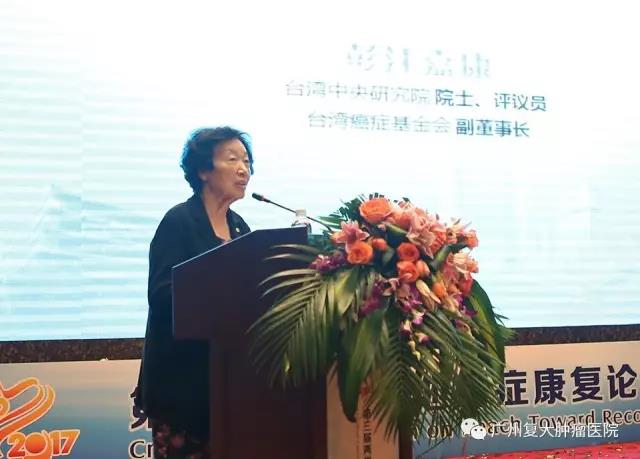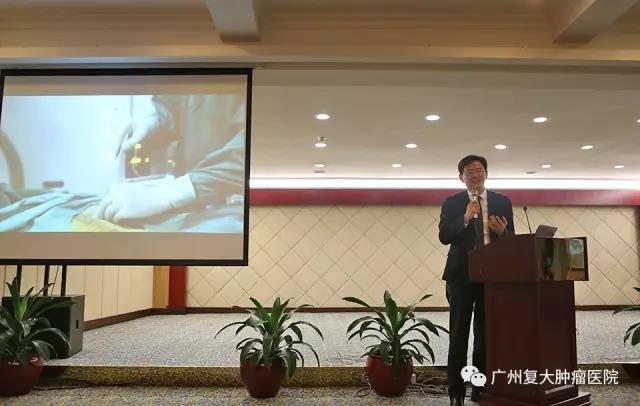From June 3 to June 4, 2017, the 3rd Cross-strait Cancer Forum on Reach Toward Recovery, co-hosted by Cancer Recovery Society and Chinese Psychosocial Oncology Society of Chinese Anti-Cancer Association, organized by Guangdong Provincial Light of Life Cancer Rehabilitation Society and co-organized by Guangzhou Fuda Cancer Hospital of Jinan University, was convened in Guangzhou.

Opening ceremony
Dr. Tang Zhaoyou, academician of Chinese Academy of Engineering and well-known cancer expert, and Yin Dakui, former vice minister of the Ministry of Health, current member of the national committee of CPPCC, chief specialist of health education and president of Chinese Medical Doctor Association, Academician Wu Yiling from Chinese Academy of Engineering, and academician Peng Wangjiakang from Academia Sinica attended the conference and made keynote speeches.

Yin Dakui is delivering the speech on “Tumor & Health”
Experts and researchers from China Mainland, Hong Kong, Macao, Taiwan and Singapore, representatives from rehabilitation organizations and other more than 300 people attended the conference for sharing their experience and suggestions on cancer rehabilitation.
Along with urbanization, industrialization and aging population acceleration, the health risk factors, that caused by changing in life style and diet habit, are increasing obviously. The morbidity and mortality of cancer are in a high level. Cancer brings about heavy burden on individuals and even their whole families and further, the whole society. Therefore, “how to reduce the risk of cancer” and “how to promote the rehabilitation for cancer patients” becomes one of the topics the medical community is most concerned about.

Peng Wangjiakang, academician of Academia Sinica considers that precision medicine is a medical model that proposes the customization of healthcare, with medical decisions, practices, or products being tailored to the individual patient. It is a current medical trend, in which diagnostic testing is often employed for selecting appropriate and optimal therapies bases on the context of a patient’s genetic content or other molecular or cellular analysis. She pointed out in her speech that those treatments focusing on gene mutation could improve curative effects and reduce side effects of drugs.

Tang Zhaoyou, academician of the Chinese Academy of Engineering and well-known oncologist, made a keynote speech on “China’s Way of Cancer Control”. He mentioned that it should be tactical in treating cancer, which “elimination” and “reformation” should be adopted together. “Cancer is internal disorder of the body. Treating cancer is like the invasion of foreign enemy. Besides elimination, reformation measures are imperative. ‘Reformation’ measures include the reformation of bodily function and remnant cancer.”
Academician Tang Zhaoyou initiated the concept of “China’s Way of Cancer Control” that combines western methods with Chinese wisdom. “We should not only learn from the west, but also surpass the west. Only by making a combination of Chinese and western scientific achievements on the basis of domestic condition can we build up a new distinctively Chinese way in the area of cancer treatment.
Furthermore, moderate exercise is also one of the reformation ways. Academician Tang Zhaoyou suggests that patient’s subjective initiative should be fully mobilized and swimming is one of the best options. According to the research led by academician Tang Zhaoyou, moderate swimming can improve dopamine level in blood and dopamine owns a property of anticancer and immunoregulation. Therefore, moderate swimming can achieve a goal of controlling the tumor and minimizing the metastasis.
What can we do to help cancer patient live a happier and longer life, which is a big issue to be addressed. Professor Xu Kecheng, chief president of Fuda Cancer Hospital of Jinan University, made a speech on “Practicing China’s Way of Cancer Control” and illustrated his points in terms of mission, faith, tactics and value.

Professor Xu Kecheng noted that treating cancer is to destroy enemies while cancer control is to destroy enemies and to reform them as well. The “China’ Way of Cancer Control” is aimed at extending patient’s survival time. “Making cancer patients survival is overriding importance.” said Professor Xu Kecheng.
However, most eliminating treatments may promote remnant cancer growth and metastasis. The reason is that when those “sensitive” cancer cells are wiped out, those originally “insensitive” ones can acquire the ability to select-----they may expand in an opposite trend that could speed up cancer progress.
“Reformation” includes both the reformation of cancer cells and that of bodily microenvironment. How can we achieve that? Professor Xu Kecheng puts forward cryosurgical ablation treatment and Nanoknife ablation treatment would prevail.

Dr. Niu Lizhi, president of Guangzhou Fuda Cancer Hospital of Jinan University, sharing his experience of applying Nanoknife ablation in treating cancer.
Nanoknife ablation therapy is an revolutionary technique in tumor treatment that aims at treating pancreatic cancer, liver cancer etc. It remedies the defects of traditional ablation technique in treating pancreatic cancer and liver cancer. For example, in the past, the unique anatomic location of pancreas makes it difficult to wipe out all tumor tissues abruptly, no matter with thermal ablation or cryoablation. Nanoknife ablation technique utilizes ultrashort and high-voltage pulse to form many nano-scale permanent perforations in cell membrane and thus destroy the cell’s structure that lead to cell apoptosis. At the same time, it can well preserve those adjacent vessels, nerves, bile ducts and bones.
Nanoknife ablation has broad prospects of application not only in pancreatic cancer, but also in liver cancer with tumor in hilar region, renal cancer and prostate cancer.
In the speech, Dr. Niu Lizhi mentioned that an 89-year old pancreatic cancer patient was successfully treated by Nanoknife ablation therapy in Guangzhou Fuda Cancer Hospital in 2016, and this is the first recorded eldest pancreatic cancer patient who has undergone Nanoknife ablation. Dr. Niu also pointed out that Nanoknife is one of preferable option for those patients whose tumor cannot be resected or those patients whose conditions are not allowed for open surgery.